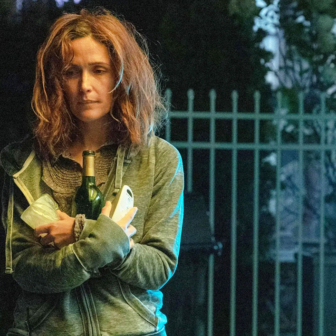You don’t need to have heard of Fred Rogers, and I hadn’t, to relish A Beautiful Day in the Neighborhood. The descriptor it features — “Inspired by a true story” — always seems to me to make life sound much more orderly than is usually the case. But it’s undoubtedly true that Fred Rogers was a much-loved twentieth-century TV presenter, mainly of children’s programs. He was the creator and host of the preschool series Mister Rogers’ Neighborhood, which ran from 1968 to 2001, and, as well as being a television personality, composer and puppeteer, was also a Presbyterian minister.
The film’s other protagonist is Lloyd Vogel, based on the real-life figure of Tom Junod, an Esquire journalist sent to interview Fred at his studio in Pittsburgh. The pair developed a life-long friendship, the result of an essential interest in humanity that could lead Rogers to reverse the roles of interviewer and interviewee, with no motive other than an innate goodness — and if you think “goodness” isn’t interesting or complex enough to make absorbing entertainment, forget it.
The two key roles have been perfectly cast. Tom Hanks, possibly drawing on aspects of his own personality and difficult early life, plays Rogers. In the role, he shows how a man can work at goodness and in doing so perhaps bring some solace to those leading more fraught lives. The fraught life here is brilliantly incarnated in Matthew Rhys’s Lloyd Vogel, a subtle study in suppressed anger. The interaction of these two makes for a humane and engrossing film — humane not in the sense of feel-good but in treating virtue as a complex phenomenon. If you saw director Marielle Heller’s previous film, Can You Ever Forgive Me?, none of the above will be surprising.
Heller’s new film opens on an image of a model neighbourhood that proves to be part of the set for Fred Rogers’s television series. He enters, sings the title song, then opens a series of small doors on a picture-board, the last of which reveals Lloyd’s damaged, unhappy face. Lloyd has had a tricky time forgiving the person who hit him, Fred tells us, but forgiveness can release us from feelings of anger. We gain a glimpse of Fred’s backstory, and the image of the model village — and thus of a real-life neighbourhood — is revealed to be part of a big city.
Lloyd’s win in the 1998 National Magazine Awards has not brought him much happiness. His mother died when he was young and his father, Jerry, had offered her no comfort nor felt any obligations to his children, Lloyd and Lorraine, whom he deserted. Lloyd and his understanding wife Andrea (Susan Kelechi Watson) have a baby, and they are first seen when packing to go off overnight to his sister’s wedding. Lloyd’s reluctance is wittily expressed in his belief that the “purpose of babies is to let you out of unwanted social obligations.”
Things don’t get any better at the wedding. To Andrea, the bridegroom “looks terrified.” “So he should,” says Lloyd, “he’s marrying Lorraine.” What brings matters to a head is the unexpected, and soon drunken, presence of Jerry (Chris Cooper), who to Lloyd’s unhappy surprise has turned up to “give away” the daughter he long ago deserted. When Jerry dares to talk of his long-dead wife, Lloyd punches him, receiving in return the blow to the face that accounts for the picture-board image at the beginning of the film.
This is not to suggest that the film is preparing us for a conventional family drama; rather, it is setting up its essential narrative impetus — the relationship that will develop from Lloyd’s meeting with Fred. Lloyd’s editor, Ellen (played by Christine Lahti with an appropriate quiet authority), sends him off to write a profile of the much-loved Rogers. Lloyd’s interviewees usually hate the resulting articles, and even his wife urges him not to “spoil my childhood” by coming up with a cynical piece about Rogers.
The core of the film — and its heart — is the way Lloyd’s assignment will help him begin working through the traumas of his life. At an early point, following questions from Fred and talk of Lloyd’s marriage, Lloyd has to insist that it is he who is meant to be doing the interviewing. If the colourfully sweatered ordinariness of Fred’s persona is not all there is to him — and the film’s closing minute gives us our one conclusive insight into this — Lloyd’s uneasy dealings with his own inner life are what provide the essential narrative trajectory of the film.
Marielle Heller never lets A Beautiful Day in the Neighborhood degenerate into the predictable. As she showed in Can You Forgive Me?, she is adept at steering a pair of protagonists through moments, sometimes small but always telling, in which they learn more about each other. Conversation reveals a great deal without either film lapsing into mere talkativeness.
Those others who make their presence felt in the film’s various contexts — the studio, Lloyd’s and Fred’s homes, the scene of Jerry’s final illness — contribute to our grasp of what has made the central friendship so rewarding and how it leads Lloyd to reappraise the demands of his life. Cooper’s Jerry makes us aware that even a wrong-headed approach to living may not be all that can be said of him, and Kelechi Watson as Lloyd’s patient, quietly loving wife is a model of understatement’s potency.
Above all, though, it is Rhys and Hanks who, under Heller’s guidance, ensure that A Beautiful Day in the Neighborhood is also tonally perfect. •




